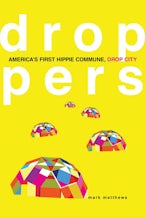Droppers
America’s First Hippie Commune, Drop City
Published by: University of Oklahoma Press
Imprint: University of Oklahoma Press
248 Pages | 6 x 9 | 25 b&w illus., 1 map
$16.95
$16.95
Published by: University of Oklahoma Press
Imprint: University of Oklahoma Press
248 Pages | 6 x 9 | 25 b&w illus., 1 map
$16.95
$16.95
Sex, drugs, and rock ’n’ roll. In popular imagination, these words seem to capture the atmosphere of 1960s hippie communes. Yet when the first hippie commune was founded in 1965 outside Trinidad, Colorado, the goal wasn’t one long party but rather a new society that integrated life and art. In Droppers, Mark Matthews chronicles the rise and fall of this utopian community, exploring the goals behind its creation and the factors that eventually led to its dissolution.
Seeking refuge from enforced social conformity, the turmoil of racial conflict, and the Vietnam War, artist Eugene Bernofsky and other founders of Drop City sought to create an environment that would promote both equality and personal autonomy. These high ideals became increasingly hard to sustain, however, in the face of external pressures and internal divisions.
In a rollicking, fast-paced style, Matthews vividly describes the early enthusiasm of Drop City’s founders, as Bernofsky and his friends constructed a town in the desert literally using the “detritus of society.” Over time, Drop City suffered from media attention, the distraction of visitors, and the arrival of new residents who didn’t share the founders’ ideals.
Matthews bases his account on numerous interviews with Bernofsky and other residents as well as written sources. Explaining Drop City in the context of the counterculture’s evolution and the American tradition of utopian communities, he paints an unforgettable picture of a largely misunderstood phenomenon in American history.
A former wildland firefighter and freelance journalist, Mark Matthews is the author of Smoke Jumping on the Western Fire Line: Conscientious Objectors during World War II and A Great Day to Fight Fire: Mann Gulch, 1949.
This website uses cookies so that we can provide you with the best user experience possible. Cookie information is stored in your browser and performs functions such as recognising you when you return to our website and helping our team to understand which sections of the website you find most interesting and useful.
Strictly Necessary Cookie should be enabled at all times so that we can save your preferences for cookie settings.
If you disable this cookie, we will not be able to save your preferences. This means that every time you visit this website you will need to enable or disable cookies again.

